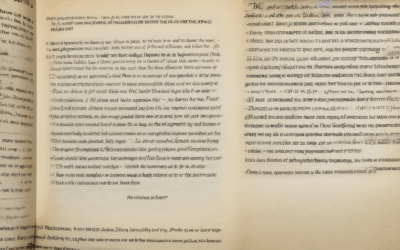Throughout history and across cultures, stories of courage and hope have inspired countless individuals to overcome adversity and embrace life’s challenges with resilience. Whether drawn from ancient tales, biblical narratives, or modern-day accounts, these stories resonate deeply, offering timeless wisdom and a beacon of light in uncertain times. From historical heroes who dared to stand against the odds to everyday individuals whose perseverance redefined what it means to hope, these tales remind us that even in darkness, the flicker of courage and the spark of hope can illuminate our path forward. This exploration delves into the powerful lessons these stories hold, drawing from history’s richest chapters and the profound teachings of the Bible, while also shining a light on contemporary inspirations that continue to shape our understanding of strength and optimism.
Key Takeaways
– Embrace Fear as a Catalyst for Growth: Courage isn’t about avoiding fear but using it to drive progress and achieve greatness.
– Stand Strong for What You Believe: Courage demands integrity and the will to defend your values, even in challenging times.
– Inspire Others Through Your Actions: Demonstrating courage uplifts and motivates others, fostering a ripple effect of empowerment.
– Learn from Heroes of the Past: Histories of brave individuals reveal how courage sparks societal change and inspires future generations.
– Cultivate Courage Daily: Develop courage by aligning your actions with your values and taking incremental steps toward your aspirations.

Historical Acts of Courage
- Harriet Tubman : Harriet Tubman escaped slavery and led others to freedom via the Underground Railroad, risking her life to help enslaved individuals reach safety.
- Rosa Parks : Rosa Parks refused to give up her seat on a segregated bus in Montgomery, Alabama, sparking the civil rights movement and challenging racial segregation.
- Joan of Arc : As a young woman, Joan of Arc led French troops in battle against English forces during the Hundred Years’ War, embodying bravery and leadership in an unconventional role for women.
Real-Life Example of Hope
A real-life example of hope can often be found in situations where individuals overcome significant challenges to achieve their goals. One such instance is the story of Project HOPE , an organization focused on providing healthcare education and support in underserved regions around the world. Despite facing numerous obstacles, including limited resources and logistical challenges, Project HOPE continues to make a profound impact, bringing hope to communities in need.
Another example is the story of Malala Yousafzai , a young activist who survived an assassination attempt by the Taliban for advocating for girls’ education. Her resilience and continued efforts to promote education despite severe adversity embody the spirit of hope, inspiring millions worldwide to fight for justice and equality.
Hope can also manifest in everyday situations, such as recovering from illness or overcoming financial difficulties. For instance, many people have shared their journeys of rebuilding their lives after experiencing hardship, demonstrating how hope can be a powerful catalyst for recovery and transformation.
In summary, hope is not merely a abstract concept—it is a tangible force that drives individuals to overcome obstacles and achieve positive change in their lives and communities. Whether it’s through global initiatives, personal triumphs, or collective efforts, hope serves as a beacon of inspiration and motivation.

The Most Motivational Story
When considering the most motivational story, it’s essential to look beyond individual achievements and focus on overcoming adversity. One of the most powerful examples is Malala Yousafzai, who survived an assassination attempt by the Taliban at the age of 15 and later became a global advocate for girls’ education. Her story embodies resilience, courage, and the unwavering pursuit of justice.
Another remarkable tale is that of Elon Musk, co-founder of Tesla and SpaceX. His journey from a young entrepreneur facing significant setbacks to becoming one of the world’s most influential business leaders serves as a testament to perseverance and vision. Despite numerous challenges, including near-bankruptcy and public scrutiny, he remained committed to his goals and revolutionized industries.
Mahatma Gandhi’s life is often cited as a source of inspiration. His nonviolent resistance against British rule in India not only freed his nation but also set a global standard for peaceful protest and leadership. His story highlights the power of sacrifice and the belief in change through collective action.
Additionally, the story of a unknown teacher in a remote village who transformed the lives of hundreds of children through education underscores the impact of dedication and compassion. This simple yet profound narrative shows how small actions can lead to significant positive changes in one’s community.
These stories remind us that motivation often arises from overcoming obstacles rather than achieving success. They inspire us to embrace challenges, pursue our passions, and make a difference in the world.
- Malala Yousafzai: A symbol of resilience and activism, her journey from a schoolgirl to a global leader demonstrates the transformative power of education and speaking up for what’s right.
- Elon Musk: His story teaches us that innovation and vision can overcome immense obstacles, pushing boundaries in technology and space exploration.
- Mahatma Gandhi: His legacy emphasizes the importance of nonviolence and the ability to lead through unity and sacrifice.
- A Teacher’s Impact: Sometimes, the most profound motivation comes from those who dedicate their lives to nurturing others, showing that education and kindness can create lasting change.
For further reading, explore more motivational stories and insights on Peter Spirito , a platform dedicated to authentic storytelling and personal reflection.

The Moral of the Story of Courage
Courage is often at the heart of great stories, offering timeless lessons about bravery, resilience, and the power of taking action despite fear. The moral of the story of courage emphasizes the importance of standing firm in your beliefs, confronting challenges head-on, and inspiring those around you to pursue their own version of greatness. Here’s a deeper exploration of the concept:
- Embracing Fear as a Catalyst for Growth
Courage isn’t about the absence of fear but rather the willingness to face it and move forward. Fear is a natural response to uncertainty, but it becomes a catalyst for growth when you choose to act despite it. Many of history’s greatest achievements were born from fear, whether it was fear of failure, fear of the unknown, or fear of societal judgment. By embracing this fear and channeling it into productive action, you unlock new possibilities and create opportunities for yourself and others. - Standing Up for What You Believe In
Courage also involves defending your values and principles, even in the face of opposition. Whether it’s advocating for social justice, speaking out against injustice, or simply sticking to your convictions in a tough situation, courage requires integrity and the courage to do what’s right, even when it’s uncomfortable. Acts of courage can inspire others to join your cause, creating a ripple effect that leads to meaningful change. - Inspiring Others Through Your Actions
The moral of many courageous stories lies in their ability to uplift and motivate those around them. When you show courage, you demonstrate that it’s possible to overcome obstacles and achieve your goals. This, in turn, can ignite a fire within others, encouraging them to pursue their own dreams and take risks. Courage has a transformative power that extends far beyond the individual—it creates a chain reaction of inspiration and empowerment. - Learning From Historical Examples
Throughout history, countless individuals have shown courage in remarkable ways. Figures like Martin Luther King Jr., Malala Yousafzai, and Rosa Parks demonstrated unwavering resolve in the face of adversity, proving that courage can lead to profound societal change. Their stories remind us that true courage isn’t just about individual strength but also about collective progress and the enduring belief in a better future. - Practical Steps to Cultivate Courage
To embody the moral of courage, start by identifying your values and passions. Then, take small steps toward realizing them, even when faced with doubt or resistance. Surround yourself with supportive friends or mentors who can guide you and provide encouragement. Remember, courage is a skill that can be developed over time through practice and perseverance.
The moral of the story of courage is that it’s not just about individual heroism but about fostering a mindset that inspires and empowers others. By embracing fear, standing up for what’s right, and taking bold action, you become a force for positive change in your community and the world.
What Does Courage Teach Us?
Courage is a powerful trait that teaches us valuable lessons about ourselves and the world around us. It embodies vulnerability, resilience, and the willingness to face challenges head-on. Here’s what courage teaches us:
- Vulnerability is Strength: Courage requires us to be open and honest about our fears and struggles. It allows us to connect with others on a deeper level, fostering empathy and understanding.
- Action Over Fear: Courage encourages us to take action despite fear. Whether it’s pursuing a dream, standing up for what we believe in, or confronting difficult situations, courage pushes us beyond our comfort zones.
- Resilience Building: When we face obstacles, courage helps us develop resilience. It teaches us that overcoming challenges strengthens us rather than diminishes us.
- Emotional Intelligence: Courage fosters emotional intelligence. By acknowledging our emotions and understanding others’, we gain the ability to navigate complex social situations with grace and wisdom.
- Self-Discovery: Often, courage is the catalyst for self-discovery. It forces us to reflect on who we are and what we truly want, leading to personal growth and transformation.
- Compassion and Empathy: Courage inspires compassion and empathy. By embracing our own vulnerabilities, we learn to see the world through the eyes of others, promoting kindness and understanding.
In essence, courage is not just about bravery; it’s about growth, learning, and becoming the best version of ourselves. It reminds us that life’s challenges are opportunities for strength and progress.

Two Examples of Moral Courage
- Example 1: During World War II, Japanese soldiers on the island of Iwo Jima faced extreme danger but chose to protect a U.S. Marine Corps private named Harold Schultz, despite the likelihood of severe punishment. Their act of compassion and bravery exemplifies moral courage.
- Example 2: In 2018, a high school teacher in Texas stood up against school administrators to advocate for students’ right to free speech after discovering that the school had banned a student newspaper. Her unwavering commitment to justice and freedom of expression demonstrated moral courage.
These examples highlight the strength of character required to uphold ethical principles in challenging circumstances.




0 Comments